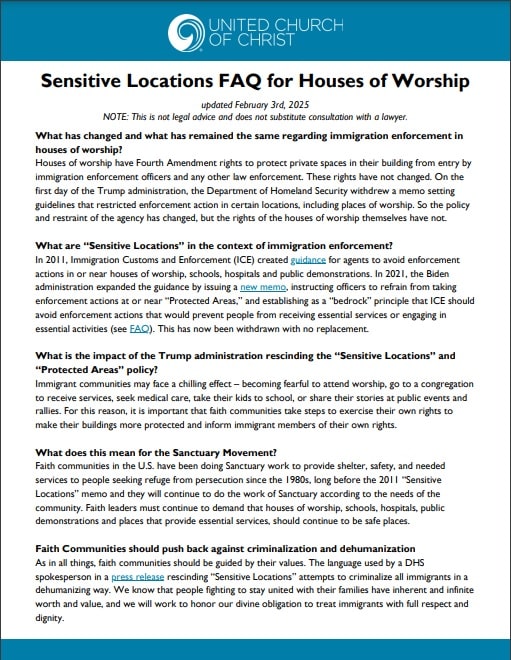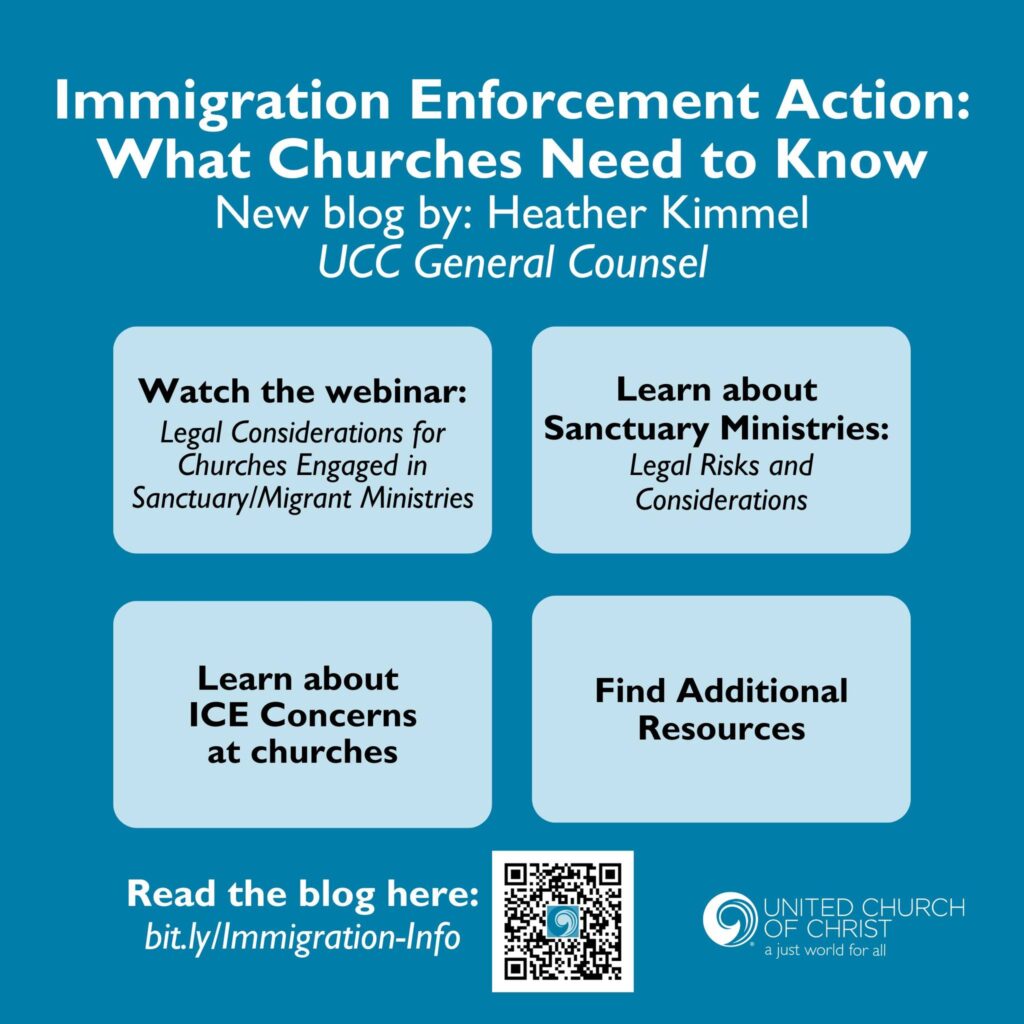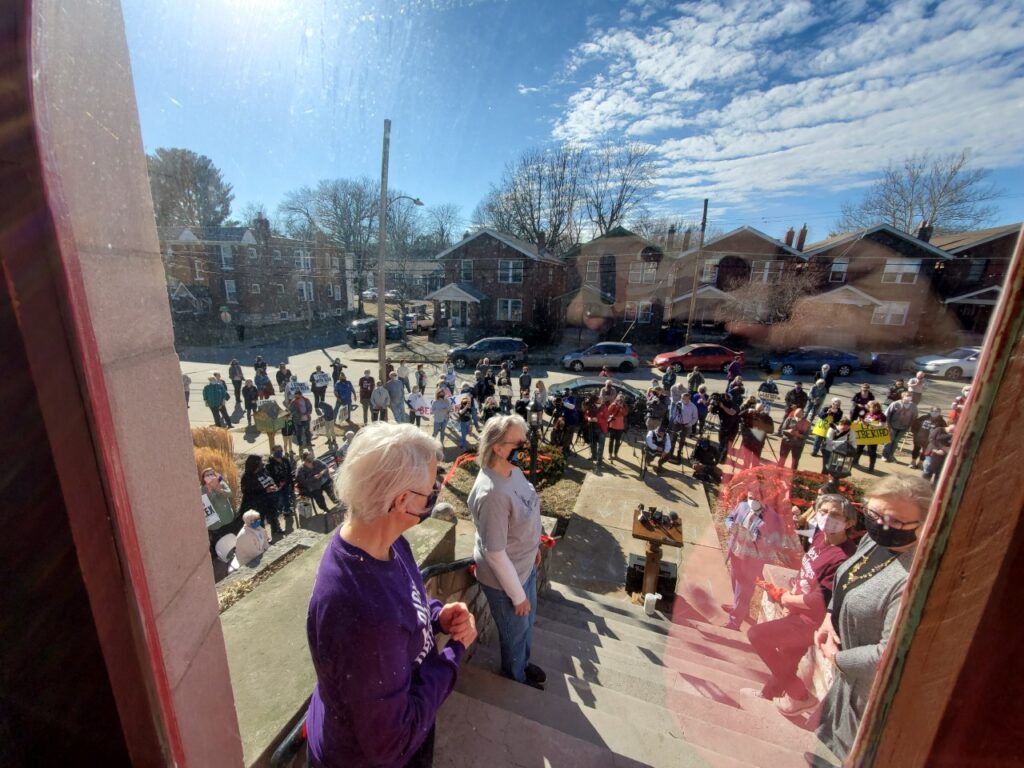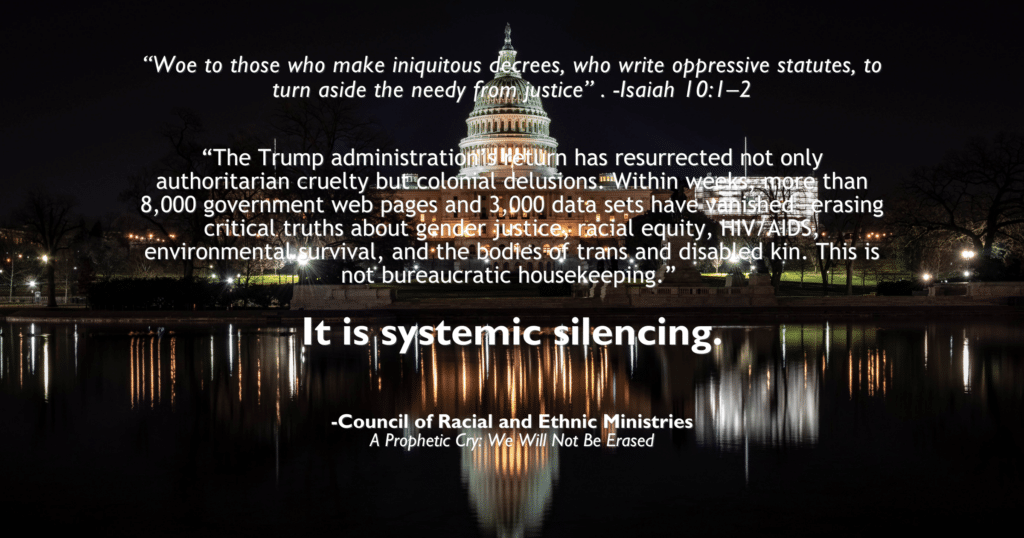‘Welcoming immigrants in our midst’: New resources for churches in the wake of policy changes
It has been a long practice of churches to open their doors to immigrants faced with threats of deportation as part of their ministry.
United Church of Christ congregations have quite a few stories to share of families, including young children, who were able to walk free in 2021 after years of finding sanctuary in North Carolina, Michigan, Missouri, Massachusetts, and Ohio churches.
The practice has been protected since 2011 by federal guidance restricting immigration enforcement in “sensitive locations” like churches and schools. As the Trump administration recently reversed the policy and withdrew these protections, many churches are discerning how to move forward. A coalition of Quaker groups has already sued to block enforcement.
To aid congregations, UCC leaders have created new resources for faith communities who love and serve immigrants in a variety of ways.
“Our office has heard from many UCC congregations concerned with what impact this change would have on their ministries and communities,” said the Rev. Michael Neuroth, director of the Office of Public Policy and Advocacy in Washington, D.C. “This policy change on top of dehumanizing rhetoric has sparked anxiety and uncertainty for immigrant families, asylum seekers, and refugees. Yet, as a denomination that has proclaimed itself to be an ‘Immigrant Welcoming Church,’ I know that we will continue to love our neighbors and draw strength from our collective witness.”
Sensitive Locations FAQ for Houses of Worship
The D.C. Office has released a Sensitive Locations FAQ for Houses of Worship, created in collaboration with the Rev. Noel Andersen, UCC minister for Immigration Justice.

Andersen highlighted that the practice of churches offering Sanctuary has existed long before the “sensitive locations” policy guidance.
“Faith communities in the U.S. have been doing Sanctuary work to provide shelter, safety, and needed services to people seeking safety since the 1980s, long before the 2011 ‘Sensitive Locations’ memo, and they will continue to do this work, especially as we face increased raids and immigration enforcement,” Anderson said. “Congregations have Fourth Amendment rights to protect private spaces in their building from entry by immigration enforcement officers and any other law enforcement. These rights have not changed.”
The FAQ offers logistical advice – which is not legal advice — together with a reminder of the human dignity and fearful impact that policies like these can have on immigrant communities, making it even more important for churches to offer support.
“The UCC has a long history of offering compassion and solidarity in the struggle for dignity and human rights for all, regardless of immigration status,” Neuroth said. “Our churches engaged this work before the 2011 ‘Sensitive Locations’ memo, and I believe they will continue this work even now as it has been rescinded. This work and witness is part of who we are as the church and the extravagant welcome we are called to extend as Christians regardless of race, gender, sexual orientation, ability, or immigration status. All are loved. All are welcome.”
What Churches Need to Know: Resource and Webinar
UCC General Counsel Heather Kimmel has created the resource “Immigration Enforcement Action: What Churches Need to Know.” In it, she addresses the law, risks of these ministries, and steps that local churches can take to prepare themselves – both for the uncertainty of how immigration enforcement will be carried out and for the possibility that ICE agents will come to churches.

This resource includes a recent webinar, “Legal Considerations for Churches Engaged in Sanctuary/Migrant Ministries,” that featured Kimmel. The webinar recording is available from the Insurance Board.
Kimmel suggests that local churches should make a plan now if they have any concerns about ICE showing up at their church to conduct an immigration enforcement action, and she offers suggestions about what this plan might include.
She offers a list of additional resources from the ACLU and National Immigration Law Center.
‘Lift up a prophetic witness’
Faith communities across the country are building coalitions of support and vowing to resist dehumanizing immigration policies.
Andersen, who is also working on a Know Your Rights document and an updated Sanctuary Toolkit yet to come, encourages UCC faith communities to remain guided by their values.
“As the UCC, we follow a higher calling, understanding God’s Executive Orders include welcoming immigrants in our midst, loving our neighbors, and caring for those in need as primary principles in our faith tradition,” he said. “Let us lift up a prophetic witness in the face of dehumanizing and discriminatory language designed to stoke fear in our communities.”
Find more immigration information and resources from the UCC here.
Content on ucc.org is copyrighted by the National Setting of the United Church of Christ and may be only shared according to the guidelines outlined here.
Related News
UCC churches and faith communities join in protest of political prisoner
Members of Washington, D.C. area United Church of Christ congregations joined with other faith...
Read MoreMy Country ‘Tis of Thee
Lately, there has been much conversation about immigration policies in the United States. The...
Read More‘An exorcism attempt’: COREM statement calls out Trump administration’s harmful policies
The Council for Racial and Ethnic Ministries (COREM) released what they are calling “A...
Read More



